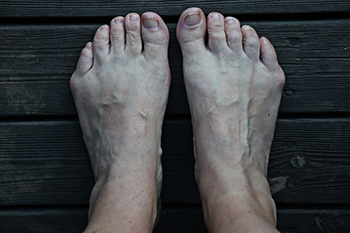
A tailor's bunion, also known as a bunionette, is a bony bump that forms on the outside of the foot at the base of the little toe. Unlike a regular bunion, which affects the big toe joint, a tailor's bunion develops when the fifth metatarsal bone shifts outward. Common causes include genetics, wearing tight or narrow shoes, abnormal foot structure, or repetitive pressure on the foot. Symptoms often include pain, swelling, and redness surrounding the bump, especially when wearing shoes. Diagnosis typically involves a physical exam and X-rays to assess bone alignment. Treatment ranges from wearing wider shoes, using padding, or orthotics to reduce pressure, to anti-inflammatory medications and surgery. If you are experiencing persistent pain or discomfort from a tailor's bunion, it is suggested that you consult a podiatrist for relief options.
If you are suffering from bunion pain, contact Ali Davis, DPM of The Foot Clinic. Our doctor can provide the care you need to keep you pain-free and on your feet.
What Is a Bunion?
Bunions are painful bony bumps that usually develop on the inside of the foot at the joint of the big toe. As the deformity increases over time, it may become painful to walk and wear shoes. Women are more likely to exacerbate existing bunions since they often wear tight, narrow shoes that shift their toes together. Bunion pain can be relieved by wearing wider shoes with enough room for the toes.
Causes
- Genetics – some people inherit feet that are more prone to bunion development
- Inflammatory Conditions - rheumatoid arthritis and polio may cause bunion development
Symptoms
- Redness and inflammation
- Pain and tenderness
- Callus or corns on the bump
- Restricted motion in the big toe
In order to diagnose your bunion, your podiatrist may ask about your medical history, symptoms, and general health. Your doctor might also order an x-ray to take a closer look at your feet. Nonsurgical treatment options include orthotics, padding, icing, changes in footwear, and medication. If nonsurgical treatments don’t alleviate your bunion pain, surgery may be necessary.
If you have any questions, please feel free to contact our office located in Overland Park, KS . We offer the newest diagnostic and treatment technologies for all your foot care needs.
